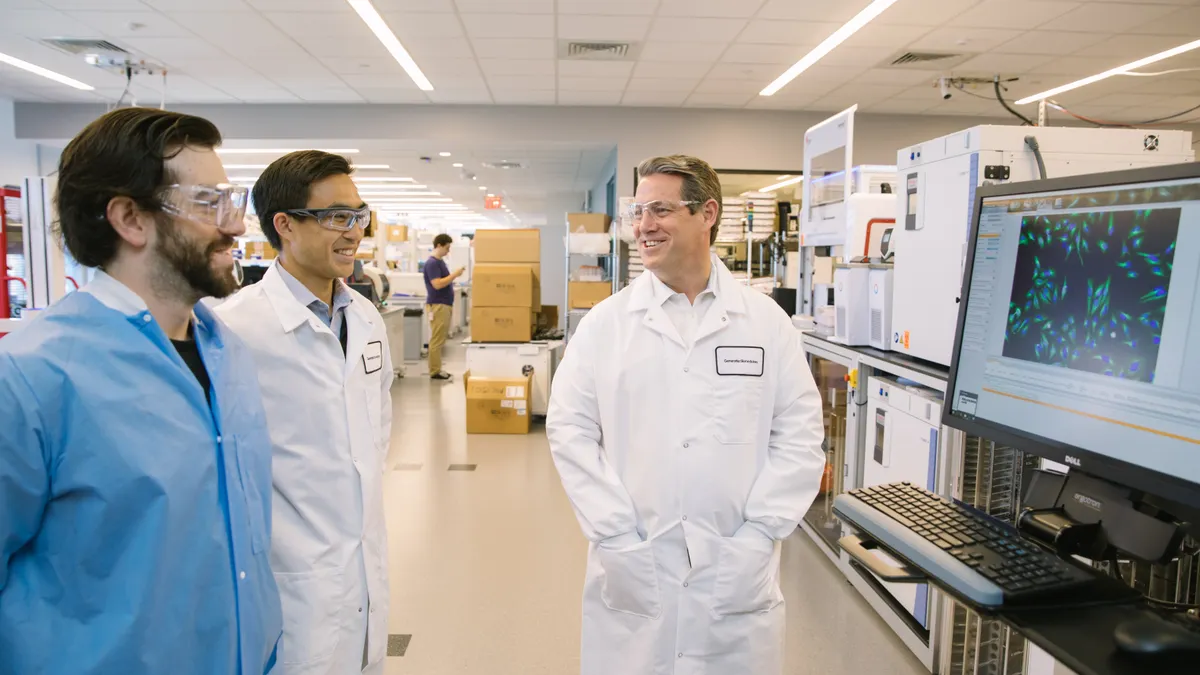Cassava Sciences has faced intense regulatory scrutiny over alleged clinical impropriety in studies of its experimental Alzheimer’s disease drug. Most recently, Cassava agreed to pay millions of dollars to resolve corporate misconduct allegations from the Securities and Exchange Commission.
Now, some experts want Cassava to get more attention from the FDA and have its clinical programs halted.
Last week, the beleaguered biotech announced it will pay $40 million to resolve the SEC investigation into whether it misled investors with doctored data.
The accusations stem from a Phase 2 trial testing the company’s lead drug, called simufilam. According to SEC charges, Hoau-Yan Wang — the drug’s co-developer, an associate medical professor at the City University of New York’s Medical School and a Cassava consultant — “received information that unblinded him” to some of the mid-stage data. Wang then manipulated the data “to create the appearance that the drug had caused dramatic improvements in biomarkers associated with Alzheimer’s … such as total tau,” the SEC said.
Cassava published these results, but not the full set of patient data, and didn’t disclose Wang’s financial stake in the trial’s success, the SEC alleges.
The SEC charged Wang separately and reached settlements with Cassava’s former CEO and senior vice president of neuroscience for their roles in publishing the data.
None of the parties investigated by the SEC admitted guilt in their settlements, and the company’s new CEO, Richard Barry, who took the reins last month, is attempting to move on.
“Cassava is pleased to put this matter behind us,” Barry said in a statement. “We can now focus all of our attention on completion of the ongoing Phase 3 trials of simufilam.”
But calls for Cassava’s trials to be stopped have persisted.
A troubled past
Matthew Schrag was introduced to the Cassava controversy in 2021. Because of his position as a vascular neurologist and assistant professor of neurology at Vanderbilt University, a colleague who needed an expert in Alzheimer’s clinical trials gave him a call.
In particular, Schrag was asked to help a lawyer who had filed a petition for two clients alleging Cassava presented results for simufilam with “anomalies” in images using Western blots, which display proteins in tissue samples. The clients, doctors Geoffrey Pitt and David Bredt, called on the FDA in their petition to stop Cassava’s clinical program.
Schrag’s analysis of Cassava’s preclinical and early-stage work confirmed their suspicions.
“The degree to which the drug bound to the target was extraordinarily high,” Schrag, whose investigative work is independent of his role at Vanderbilt, explained. “And then there was evidence of image tampering that made it look like samples were moved around and reused.”
Pitt and Bredt later acknowledged they had also shorted the company’s stock, which Cassava’s then-CEO said allowed them to profit from the public scrutiny. The FDA ultimately denied the petition.
Still, suspicions mounted around Cassava’s work. In 2022, an FDA investigation into a CUNY lab used by Wang revealed improper equipment maintenance and a lack of data security.
Last year, CUNY launched its own investigation into Wang. Although the inquiry was later halted, documents obtained by the journal Science revealed Wang failed to supply raw data to investigators who found “long-standing and egregious misconduct” in Wang’s “data management and record keeping.”
Wang was also indicted by the Department of Justice in June for “defrauding” the NIH out of $16 million in grant funding. After the DOJ announcement, Cassava issued a statement noting Wang is no longer involved in the company’s clinical trials.
None of this pressure has stopped Cassava’s clinical team from continuing their work, however.
Cassava’s trials
In late September, Cassava disclosed that a safety review board had conducted an interim analysis of its two Phase 3 trials for simufilam and recommended the studies proceed as planned.
Schrag called simufilam a “hodge-podge” mix of the beta-amyloid hypothesis — the approach tied to clearing amyloid plaques from the brain — and an idea that emerged in the 90s suggesting that restoring levels of the neurotransmitter acetylcholine could improve Alzheimer’s outcomes.
“I think there’s virtually no supportive evidence for this approach outside of Cassava,” Schrag argued.
Cassava reported summary data from a mid-stage trial in 2023 suggesting simufilam “slowed cognitive decline” by 38% compared to a placebo in people with mild to moderate Alzheimer’s.
But Schrag’s evaluation of Cassava’s clinical results along with the SEC’s claims of misconduct mean the Phase 3 program was built on “tampered” data, he said. Schrag argued there’s “no rationale” to continue the Phase 3 trials, pointing out that, even with a positive outcome from a pivotal study, the FDA couldn’t give a “responsible” approval.
“I don’t think any data coming out of Cassava can possibly be trusted,” Schrag said.
“These trials [should] have never been permitted to start, so I’m astonished by the direction this has gone,” he said. “There is a moral obligation not to experiment on patients in this context.”
Cassava’s Phase 3 trials have enrolled some 1,900 participants.
The FDA declined to comment on the matter, saying it is generally “unable to discuss existing or potential applications” in an email statement, adding that it involves “confidential commercial information.”
In an emailed statement sent after this story was published, a Cassava spokesperson defended the company’s scientific rationale, arguing “the hypothesized mechanism of action for simufilam is supported by extensive research conducted by laboratories independent of Cassava and CUNY ... [including] laboratories that have tested the drug using assays and animal models in both Alzheimer’s disease and other diseases.”
“There is no reason to terminate Cassava’s Phase 3 trials,” the spokesperson said.
While patient advocacy groups often support the study of new treatments, Alzheimer’s Association CEO Joanne Pike declined to weigh in on whether Cassava’s trials should continue. She noted that her organization doesn’t have “all the data and information the FDA uses to make their decisions about accepting or rejecting a clinical trial.”
However, Pike pointed out that Cassava’s Phase 3 participants should be “fully informed.”
“The Alzheimer’s Association strongly encourages a participant-centered approach to research, and responsible communications with trial participants,” Pike said in an email.
And despite the high unmet need in Alzheimer’s, Pike emphasized that “putting profits ahead of people” and “scientific misconduct” are unacceptable.
“The Cassava Sciences case has further heightened the urgency of addressing scientific integrity in our field, and we commend the SEC’s investigation,” Pike said. “Federal agencies must aggressively pursue all credible allegations of misconduct.”
Cassava expects top line data from its first Phase 3 study by the end of this year, along with more results from the second trial by mid-2025.
Editor’s note: This story has been updated with comment from Cassava received after publication.
























